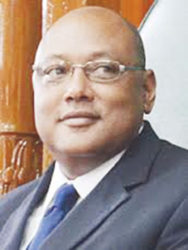The Lottery Control Commission, which is responsible for managing revenue from the lottery, appears to be defunct, with Minister Raphael Trotman, who is Chairman, saying that as far as he is aware it has not met since his appointment in July, 2015.
Trotman has told Stabroek News on several occasions over the last six months that as far as he is aware the commission has not met.
On Friday, he noted that he has written to Minister of Finance Winston Jordan and “will await a response from the minister” before commenting on the functioning of the commission. The other members of the commission are Vladim Persaud, Pamela Briggs and a representative from the youth council.

Meanwhile, Jordan has told Stabroek News that even though Trotman has attended no meetings, “things are still happening.” He directed this newspaper to the Auditor General’s report, which chronicles the spending of lottery funds, but would not acknowledge being in receipt of any other report from the commission.
“That board is not under me… It is under the purview of the [Ministry of Finance] and I know it is meant to compile a report but I don’t that it is meant to report to me… actually the audit report and commission report more or less will be the same thing. The important thing is the fund is being audited,” he said when asked about the functioning of the commission.
As explained in the 2015 Auditor General’s report, the agreement between the Government of Guyana and Canadian Bank Note Ltd (CBN), which established the Guyana lottery, requires CBN to pay licence fees equivalent to 24% of gross revenue.
In 1996, the Guyana Lotteries Commission was established by a Cabinet decision to manage the licence fees received and ensure that amounts spent are within the national sector and in accordance with the guidelines for access to the lottery funding. Over the years, the Lotteries Commission received proceeds from the lotto games that were used to make payments approved by Cabinet. These proceeds were retained in a special bank account and no amounts were paid over to the Consolidated Fund.
This decision has regularly been criticised by the Auditor General, who has said in his reports that it violates Section 43 of the Fiscal Management and Accountability Act.
Section 43 of the Act says that “except as otherwise provided in this Act or in any other law, at the end of each fiscal year, any unexpended balance or public moneys issued out of the Consolidated Fund shall be returned and surrendered to the Consolidated Fund.”
The 2015 AG’s report specifically noted that government spent in excess of $305 million from the Lottery Fund on projects, such as the D’Urban Park rehabilitation, without seeking needed parliamentary approval.
The 2015 report, which was laid in the National Assembly on October 13 last year, explained that while the Ministry of Finance budgeted for lottery receipts of $1 billion under the category ‘Miscellaneous Revenue’ and transferred $1.069 billion from the lottery fund to the Consolidated Fund, spending from the fund continues to occur without parliamentary approval.
As a result, it has recommended that expenditure from the proceeds of the National Lottery should be accounted for by having a supplementary estimate passed in the National Assembly and recorded in the public accounts.
According to the report, aside from the amount transferred to the Consolidated Fund, significant sums, which include prior year balances of $369,294 million and the proceeds of $421,754 million received for 2015, still remain in the bank account and were used to meet expenditure.
It said $305,826 million was spent, comprising $36,509 million for the rehabilitation of D’Urban Park, $65,060 million for Carifesta, $63,700 million for Mashramani, $51,583 million for music, $38,256 million for Amerindian Heritage celebrations, $28,573 million for the Department of Youth, Culture and Sport, $18,260 million for Emancipation, $14,591 million for tourism and $2,003 million for miscellaneous purposes.




